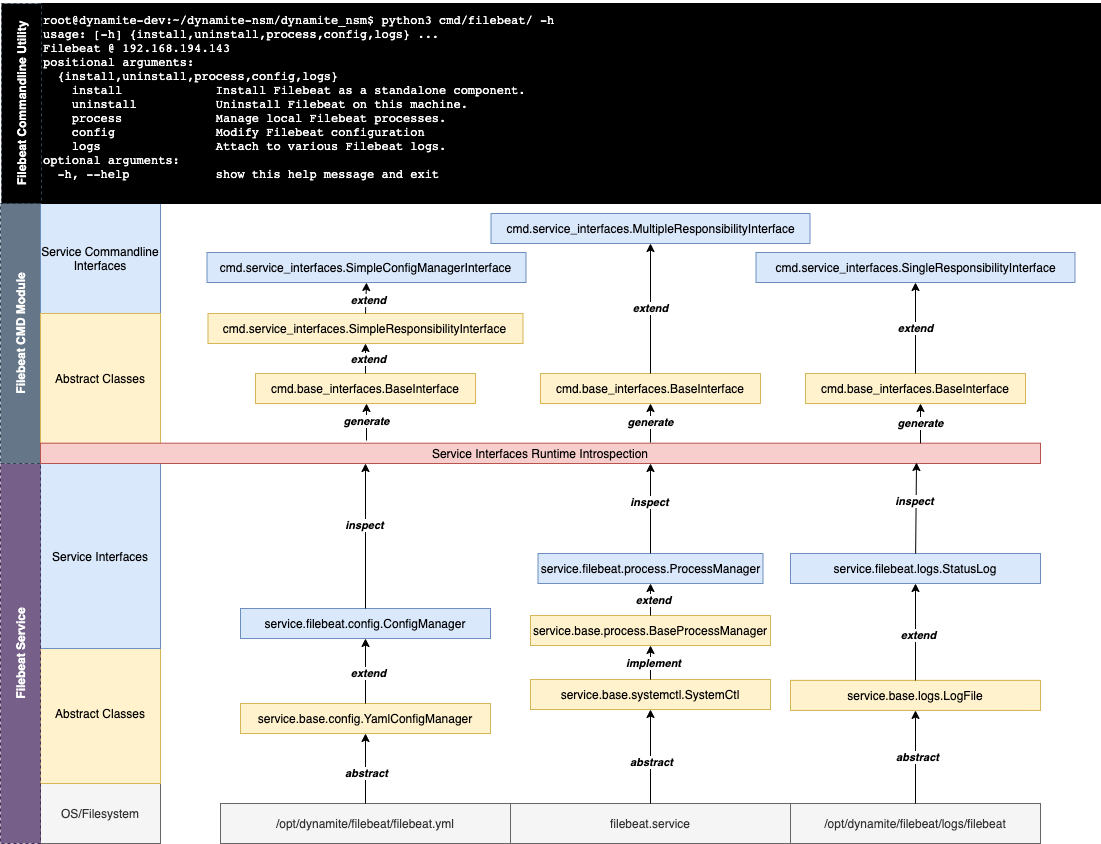Build a Commandline Utility
DynamiteNSM services SDK provides programmatic access to Zeek, Suricata, Filebeat, Elasticsearch, Logstash, Kibana,
and several other utilities. DynamiteNSM's cmd SDK provides the ability to dynamically generate commandline interfaces
for service classes.
Service Architecture

Services have three primary design principles:
-
Must provide a consistent layer of abstraction above a set of common
actions. In doing so we maintain least-surprise in keeping the development experience relatively consistent across all services. -
Must be self-contained. Each
serviceis a dedicated module with individualactionsub-modules. -
Must expose classes that fit into one of the following paradigms: single-responsibility or multi-responsibility.
Single Responsibility Class
cmd.service_interfaces.SingleResponsibilityInterface 🔗
A class that when instantiated has one primary method that will be called to make things happen.
This pattern works well with many service InstallManager.
Example Class
class InstallManager:
def __init__(self, install_directory: str):
"""
Prepare install manager, perhaps profiling the system and determining constraints
"""
def setup(self, cpus: int = 4):
"""
Perform the actual operations of installing service dependencies,
and performing some initial configuration.
"""
# Invoking the class
installer = InstallManager('/opt/dynamite/stuff')
installer.setup()
Multiple Responsibility Class
cmd.service_interfaces.MultipleResponsibilityInterface 🔗
A class that when instantiated has multiple methods that can be invoked to perform various actions.
The ProcessManager class commonly falls into this pattern.
Example Class
class ProcessManager:
def __init__(self, stdout: bool = True):
"""
Load up process information
"""
def start(self):
"""
start the loaded process
"""
def stop(self):
"""
stop the loaded process
"""
def restart(self):
"""
restart the loaded process
"""
# Invoking the class
proc_man = ProcessManager()
proc_man.start()
proc_man.stop()
proc_man.restart()
Building a Simple Service
We will use the updates service to demonstrate how to quickly prototype a dynamite cmd utility.
The updates service has one primary task. To grab the latest configurations and mirrors for external components.
The updates Service
The updates service has one action module install.py. This class does nothing too complicated, and provides a single
method upon which an interface can be derived.
class InstallManager(install.BaseInstallManager):
def __init__(self, stdout: Optional[bool] = False, verbose: Optional[bool] = False):
super().__init__('updates.install', verbose, stdout)
self.stdout = stdout
self.verbose = verbose
@staticmethod
def update_default_configurations():
"""
Retrieves the latest skeleton configurations for setting up ElasticSearch, LogStash, Kibana, Zeek, Suricata,
and Filebeat
"""
...
@staticmethod
def update_mirrors():
"""
Retrieves the latest mirrors which contain the download locations for all components
"""
...
def setup(self):
"""
Download updates and setup them up.
"""
self.logger.info(
'Attempting to download the latest mirrors and default configurations for installable components.')
self.update_mirrors()
self.update_default_configurations()
self.logger.info(
'Updates have been applied. The next time you install: elasticsearch, logstash, kibana, zeek, suricata, '
'or filebeat these updates will be applied to that component.')
Converting to a Commandline Utility
You should now be able to expose a commandline interface by wrapping the class created above inside a SingleResponsibilityInterface
with the following code.
from dynamite_nsm.services.updates import install
from dynamite_nsm.cmd.service_interfaces import SingleResponsibilityInterface
interface = \
SingleResponsibilityInterface(cls=install.InstallManager,
interface_name='Update DynamiteNSM Default Configs',
interface_description='Update mirrors and default configurations',
entry_method_name='setup',
defaults=dict(stdout=True)
)
if __name__ == '__main__':
# Get an instance of argparse.ArgumentParser
parser = interface.get_parser()
# Parse out the arguments that have been passed in
args = parser.parse_args()
# Call the execute method against the parsed args
interface.execute(args)
Calling this utility from the commandline will result in the following:
Update DynamiteNSM Default Configs - Update mirrors and default configurations
optional arguments:
-h, --help show this help message and exit
--stdout Print output to console
--verbose Include detailed debug messages